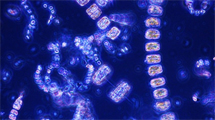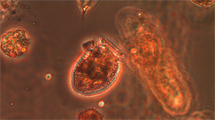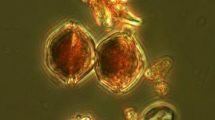Lífbrjótanlegt plast er möguleg lausn á þeim unhverfisvanda sem plastnotkun hefur skapað en það er þó mikil áskörun að afla hráefna í sjálfbæra vinnslu þess. Eiginleikar plastefnisins PHB (Poly-3-hydroxybutyrate) gera það að vænum kosti en þar sem algengar framleiðsluaðferðir þess með ófrumbjarga bakteríum er óhagkvæm er álitlegur kostur að framleiða það með blábakteríum (e. cyanobacteria). Bettina Scholz hjá Biopol hefur ræktað upp tvo íslenska blábakteríustofna sem á að nota til framleiðslu á PHB í samstarfi við Fóðurverksmiðjuna Laxá hf., Nýsköpunarmiðstöð, SagaNatura ehf., Algalíf ehf., MýSköpun ehf. og Háskólann í Rostock, Þýskalandi. Aukaafurðir framleiðslunnar geta nýst sem fiskifóður og verðmæt litarefni.
Verkefnið er styrkt af Lóu, nýsköpunarstyrkjum fyrir landsbyggðina.
Lóa Innovation Grant
The increasing impact of petrol based plastic materials on the environment is a growing global concern. Biodegradable bioplastics offer a solution to this, but it is a major challenge to find economic sources obtain platform natural products for their sustainable production. Poly-3-hydroxybutyrate (PHB) is characterized by interesting features that drew research and commercial ventures. Bacterial fermentation is a known route to produce PHB but the production by chemoheterotrophic bacteria is expensive due to the high costs of the carbon sources needed. However, the production of PHB through cyanobacteria is an attractive but underexplored alternative for a lower-cost and sustainable PHB production. Using two northern-Icelandic cyanobacteria from the indoor culture collection at BioPol ehf, a consortium comprising FÓÐURVERKSMIÐJAN LAXÁ HF, BioPol ehf (Dr. Bettina Scholz, project manager), Innovation Center, SagaNatura ehf, Algalif ehf, MýSköpun ehf, and the University of Rostock, Germany will collaborate to realize the model of a sustainable biorefinery concept to produce PHB. Pigments separated in the process will be processed as high-value by-products, and residual biomass will be developed as fish feed. The project is funded by the Lóa Innovation Grant under the title: Northern Icelandic Cyanobacteria Biorefinery as source of a versatile platform chemical for producing high value biodegradable plastics, pigments and residual biomass for aquafeeds










